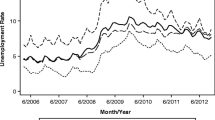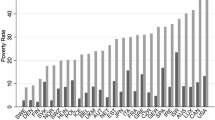Abstract
This paper investigates the extent childbearing among couples in Europe affects their level of economic well being. We do so by implementing a propensity score matching procedure in combination with a difference-in-difference estimator. Using data from European Community Household Panel Survey (ECHP), we compare how the impact of childbearing on wellbeing varies among countries. We use several measures for wellbeing, including poverty status and various deprivation indices that take into account the multidimensionality of individuals‘ assessment of wellbeing. Not unexpected we find childbearing tend to worsen the economic wellbeing of households, but with important differences in magnitude across countries. In Scandinavian countries the effect is small and rarely significant, it is strong in the UK and also significant in Mediterranean countries. Depending on the measure of wellbeing, we find important differences among countries that are similar in terms of welfare provision.
Similar content being viewed by others
References
Aassve A, Mazzuco S, Mencarini L (2005) Childbearing and wellbeing: a comparative analysis of welfare regimes in europe. J Eur Soc Policy 15(3):283–299
Bane MJ, Ellwood DT (1986) Slipping into and out of poverty: the dynamics of spells. J Hum Resources 21(1):1 – 23
Becker S, Ichino A (2002) Estimation of average treatment effects based on propensity scores. STATA J 2(4):358–377
Betti G, Verma V (1999) Measuring the degree of poverty in a dynamic and comparative context: a multi-dimensional approach using fuzzy set theory. In: Proceedings of the ICCS-VI, Lahore. 27–31 August 1999, 11:289–301
Betti G, Verma V (2002) Longitudinal measures of income poverty and life-style deprivation, Working paper 50, Dipartimento di Scienze Statistiche, University of Padua
Castles FG (2003) The world turned upside down: below replacement fertility, changing preferences and family-friendly public policy in 21 OECD countries. J Eur Soc Policy 13(3):229–227
Cerioli A, Zani S (1990). A fuzzy approach to the measurement of poverty. In: Dagum C, Zenga M (eds). Income and wealth distribution, inequality and poverty, studies in contemporary economics. Springer, Berlin Heidelberg New York, pp. 272–284
Cheli B, Lemmi A (1995) A totally fuzzy and relative approach to the multidimensional analysis of poverty. Econ Notes 24:115–134
Dehejia R, Wahba S (1998) Causal effects in nonexperimental studies: reevaluating the evaluation of training programs. J Am Stat Assoc 94(448):1053–1062
Dehejia R, Wahba S (1999) Propensity score matching methods for nonexperimental causal studies. NBER working paper no. 6829
Esping Andersen G (1990) The three worlds of welfare capitalism. Princeton University Press, Princeton
Esping Andersen G (1999) Social foundations of post-industrial economies. Oxford University Press, Oxford
EUROSTAT (2002) Income, poverty and social exclusion: second report. European social statistics, Luxembourg, pp 76–92
Ferrera M (1996) Il modello Sud-Europeo del welfare state. Rivista Italiana Scienza Politica 26(1):67–101
Gornick JC, Meyers MK (2003) Families that work: policies for reconciling parenthood and employment. Russel Sage Foundation, New York
Heckman JJ, Ichimura H, Smith J, Todd PE (1998) Matching as an econometric evaluation estimator: evidence from evaluating a job training programme. Rev Econ Stud 64:605–654
Holland PW (1986) Statistics and causal inference. J Am Stat Assoc 81:945–970
Jarvis S, Jenkins SP (1996) Changing places: Income mobility and poverty dynamics in Britain, ISER Working paper no. 19. University of Essex, Colchester
Jarvis S, Jenkins SP (1999) Marital splits and income changes: evidence from the British household panel survey. Popul Stud 53:237–254
Kohler HP, Billari FC, Ortega JA (2002) The Emergence of lowest—low fertility in Europe during the 1990s. Popul Dev Rev 28(4):641–680
Mayer KU (2001). The paradox of global social change and national path dependencies: life course patterns in advanced societies. In: Woodward AE, Kohli M (eds). Inclusions—Exclusions. Routledge, London, pp. 89–110
Nicoletti C, Peracchi F (2002) A cross-country comparison of survey non-participation in the ECHP. ISER Working Paper 2002-32
OECD (2001) Employment outlook
Peracchi F (2002) The European community household panel: a review. Empir Econ 27:63–90
Rosenbaum PT, Donald BR (1983) The central role of the propensity score in observational studies for causal effects. Biometrika 70(1):41–55
Smith JA, Todd P (2005) Does matching overcome Lalonde’s critique of nonexperimental estimators? J Econ 125(1–2):305–353
Trifiletti R (1999) Southern European welfare regimes and the worsening position of women. J Euro Soc Policy 9(1):49–64
Whelan CT, Layte R, Maitre B, Nolan B (2001) Income, deprivation, and economic strain: an analysis of the European community household panel. Eur Soc Rev 17:357–372
Author information
Authors and Affiliations
Corresponding author
Rights and permissions
About this article
Cite this article
Aassve, A., Mazzuco, S. & Mencarini, L. An empirical investigation into the effect of childbearing on economic wellbeing in Europe. Stat. Meth. & Appl. 15, 209–227 (2006). https://doi.org/10.1007/s10260-006-0020-x
Accepted:
Published:
Issue Date:
DOI: https://doi.org/10.1007/s10260-006-0020-x




